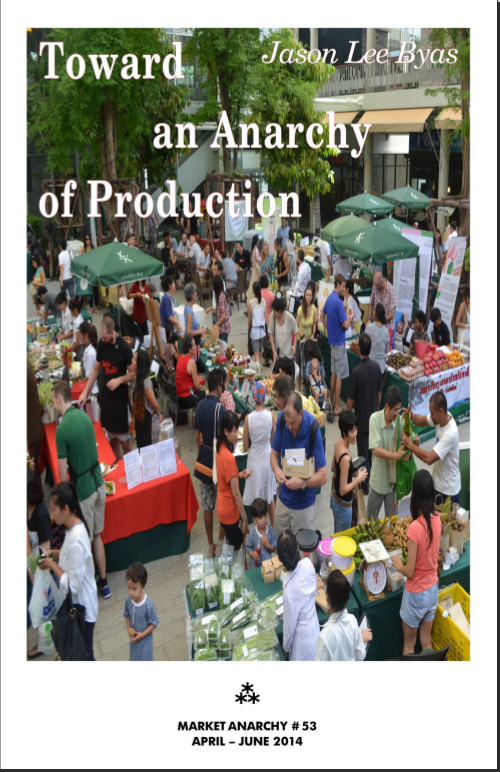C4SS has teamed up with the Distro of the Libertarian Left. The Distro produces and distribute zines and booklets on anarchism, market anarchist theory, counter-economics, and other movements for liberation. For every copy of Jason Lee Byas‘ “Toward an Anarchy of Production” that you purchase through the Distro, C4SS will receive a percentage. Support C4SS with Jason Lee Byas‘ “Toward an Anarchy of Production“.
$1.00 for the first copy. $0.60 for every additional copy.
“Any society worth calling “anarchist” is going to be one that can continually adapt to the needs and desires of the individuals within that society. This adaptation must also be to the interests of the entire community, not toward the limited aims of a specific class of people. There must be ceaseless social experimentation, and incentives toward developing institutions that benefit everyone and weeding out those that don’t. This requires markets . . . .
“While face-to-face deliberation is likely to render more equitable arrangements than some Leninist model of overt command and control, it is also exactly the situation in which the more subtle aspects of privilege and oppression are most at play. Whatever more limited social evolution occurs will be tampered by the implicit biases that influence us in more direct forms of communication. Those who are skeptical of this claim should think back on all the meetings and face-to-face deliberations of which they’ve ever been a part. People with more charismatic personalities are likely to have their views taken much more seriously. This is especially true when the person in question is white, male, cisgender, heterosexual. . . By contrast, two of the most important features of markets are radically decentralized decision-making based on distributed knowledge, and the availability of alternatives. In market transactions, one does not have to convince the community at large of the goodness behind one’s use of a given resource in order to use it. . . .
“By constantly approaching equilibrium yet never reaching it, unchained economic activity is exactly the kind of social dynamic that radicals desire: permanent revolution. A market society is a society built on continuous self-creation, whose institutions are always kept in check by the looming threat of creative destruction. In so far as anarchism is the abolition of hierarchy, the production of anarchy requires the anarchy of production. . . .”








